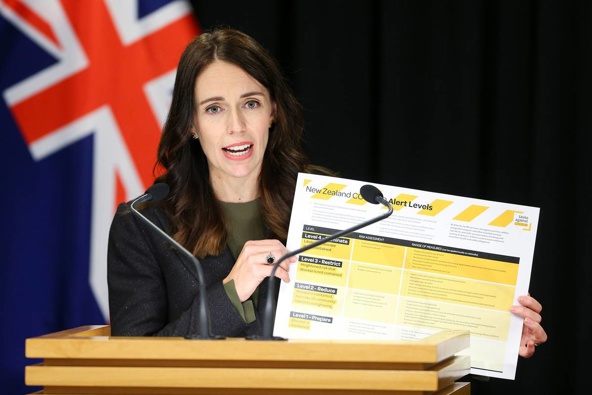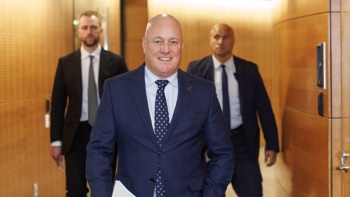Follow
the podcast on

The Government is poised to announce more economic support measures for beleaguered Kiwi businesses and workers left devastated by the Covid-19 virus.
But it comes amid a growing debate of whether New Zealand should lockdown now to try to ease as much of the impact of the virus as possible. Frontline health workers say they want to move to alert level 4 now, which would see only essential businesses open.
Healthcare systems in some of Europe's wealthiest nations are on the brink of collapse as the number of coronavirus cases surges past 311,000 with more than 13,500 deaths globally.
Italy has announced its largest day-to-day increase in infections with 53,000 total, while there are fears UK cases are "accelerating" and Spain has been forced to set up a temporary hospital inside a convention centre.
In the UK, the death toll has reached 244 - and the NHS has written to 1.5 million people who are at the highest risk of hospitalisation by the coronavirus, urging them to stay at home for 12 weeks from Monday.
Medicines will be delivered by community pharmacists, while military personnel are helping to coordinate plans to deliver groceries with local councils and supermarkets, the government has said, as it revealed more details of its plan
Pressure is growing in some quarters for New Zealand to raise the country's virus alert to the maximum level to prevent further spread and community transmission.
Fourteen new cases of coronavirus were confirmed yesterday - the highest one-day rise yet - bringing the total number infected to 66, with four additional probable cases.
Nearly all are linked to overseas travel or an already confirmed case, but two - one in Auckland and one in Wairarapa - have no firm links to either and officials have not ruled out community transmission.
One of the cases confirmed at the weekend was an Auckland rest home carer and the village has been locked down as a precaution.
Marist College in Auckland is to close for three days after a staff member tested positive for Covid-19 while the primary school next door is closing as a precaution.
Glendowie College is similarly closed for 72 hours after a student contracted the virus.
And a parent at Mt Roskill Grammar has also tested positive but the school has been told most of the wider community isn't at risk so will remain open.
As well, four people, including two New Zealanders, who went to the World Hereford cattle conference in Queenstown earlier this month have tested positive so every attendee has been told to self-isolate.
Cabinet will meet today to discuss the crisis before Prime Minister Jacinda Ardern gives an update on any developments.
Finance Minister Grant Robertson indicated there would likely be more announcements about economic support for medium and large businesses that felt they missed out on the $12.1 billion relief package unveiled last week.
The maximum amount any employer can receive from the package is $150,000.
Large and complex businesses, including some responsible for infrastructure, could expect targeted packages to help them through the crisis, Robertson told Q&A.
There could also be some more relief for workers who suddenly find themselves out of a job.
"I think you can expect more announcements from us around the economic response in the coming days," he told Q&A.
"If we do end up in a situation where we're moving up and down these levels for a number of months, what does that mean for people's incomes? What does that mean for the way we go about our daily lives?"
National Finance spokesman Paul Goldsmith said restricting domestic travel to an essential-only basis, while justified for health reasons, had added to the pressure on businesses.
"The current wage subsidy settings are too tight, so that most workers – who work for medium-sized and larger firms – are not covered," Goldsmith said.
Robertson said the Government was treating the crisis as a marathon and not a sprint, which is also why it hadn't gone directly to the highest alert level, he said.
The alert level was set on advice from experts, including Director-General of Health Ashley Bloomfield. The Government was poised to raise the alert level quickly if needed.
Meanwhile, Australia Prime Minister Scott Morrison has warned "draconian measures", including a nationwide lockdown, could soon be implemented as cases there top 1000 with seven deaths.
Four jurisdictions – the Northern Territory, South Australia, Western Australia and Tasmania – have effectively closed their borders to outside travel.
And a petition backed by frontline health workers calling for alert level 4 to be actioned immediately in New Zealand has amassed more than 5000 signatures.
Urgent care physician Dr Kelvin Ward said enforced isolation of confirmed Covid-19 patients and a full social lockdown was the only way to slow the virus' spread.
Raising the alert level to four would mean full lockdown of all non-essential businesses, rationing supplies, severe travel restrictions and major reprioritisation of healthcare facilities.
Supermarkets will stay open regardless of the alert level.
Experts have also told the Government to ramp up testing as it was one of the best chances of preventing the virus from spreading.
Otago University epidemiologist Professor Michael Baker said it was vital testing capacity was increased.
"Time is of the essence, and people have got to get tested, diagnosed and isolated very quickly for this to work."
But former prime minister Helen Clark, who is self-isolating in New Zealand, has commended the Government's "go hard and go early" approach and said it should leave "nothing to chance".
"There is no more important issue right now than stopping a huge outbreak in countries and beating it back where there already is one," she said.
"We have to repurpose and focus on that because it is a public health crisis and if it's bungled, it has very major, long-running economic ramifications."
Meanwhile, GPs have been asked to move towards having 70 per cent of their consults done virtually to drastically reduce in-person contact.
Take your Radio, Podcasts and Music with you









